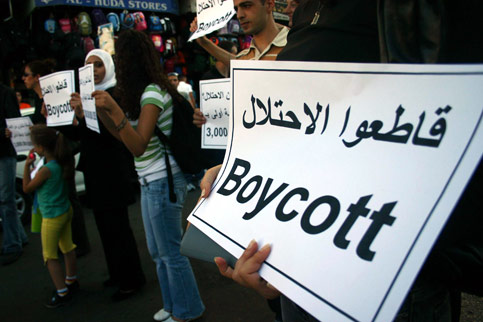IN THE MEDIA
Our misguided boycotters
May 25, 2012 | Daniel Meyerowitz-Katz

Daniel Meyerowitz-Katz
Australian Jewish News – 25 May 2012
Peter Beinart’s call for a boycott of Israelis in the West Bank opposes the policy advice of almost everyone involved in the debate on the Israeli/Palestinian conflict. Similarly, the choice of my friend and former colleague in AUJS, Liam Getreu, to adopt Beinart’s policy has place Liam at-odds with everyone in Australian Jewry bar the handful who fall far enough to the fringe of the political spectrum that they would consider a boycott, but are not quite ready to boycott Israel in its entirety.
Time and time again in these discussions, the word “settlements” is employed without context. Since the Clinton parameters in the early 1990s, it has been accepted by all significant parties that any final status agreement would involve Israel keeping the large population centres that fall just over the Green Line – especially near Jerusalem – in exchange for equivalent land that currently falls in Israel. This has been accepted by everyone in Israel from Bibi Netanyahu to Naomi Chazan, it has been accepted in principle by the leadership of the Palestinian Authority (PA), and it has been accepted by Beinart and by Liam.
The issue is not whether Israel will withdraw settlements, it is when and how Israel will withdraw, how much land Israel will withdraw from and what – if anything – either side is doing about it. This is where differences begin to surface. The “Beinartians”, as I will call them, argue that the PA has been doing its part and the Israelis have not been doing theirs – therefore, it is our duty as Jews in the Diaspora to put pressure on Israelis until popular support for settlements collapses. Beinartians take the PA at their word, believing that were Israel to completely cease all construction, the PA would be relieved of the obstacle that is currently preventing negotiations.
Each side has a litany of statements to draw on to “prove” that the PA leadership thinks one way or the other. Their assorted public statements demonstrate both peace-loving reformers and Jew-hating terrorists. Their record in office gives a similarly ambiguous impression.
Several years of genuine security cooperation with Israel has made terrorism in the West Bank negligible compared with what it once was, however suicide bombers continue to be glorified in official media and sports teams are still being named after terrorist masterminds. President Abbas once came close to securing a peace deal with then Prime Minister Olmert, but could not muster the conviction. Since then, he has been at best reluctant to negotiate with Prime Minister Netanyahu – taking 9 of the 10 months of Netanyahu’s settlement freeze to come to the table, as he had promised to, and recently backing-out of a commitment to conduct high-level negotiations, instead sending low-level diplomatic representatives to meet with the Israeli leadership.
These inconsistent messages can tell us one thing about the PA and not much else: they know how to speak to their audience.
Beinartians would then argue that sure, the PA have their faults, but we should be forcing Israel to leave the West Bank unilaterally as the “continuing occupation” is unhealthy for Israeli society. Even assuming this were true, it makes a poor case for the idea of boycotting settlements. As anyone who has been to the West Bank would know, the population in the settlements is far from monolithic and the handful of Kahhanist extremists that grab the headlines, while deplorable, are by no means representative of the entire “settler” population.
Using the Green Line as the boundary, the Beinartian definition of “settler” encompasses everyone from Hebrew University students living in the “wrong” neighbourhood of Jerusalem to the hilltop radicals that these “Zionist BDS” proponents love to hate. Whatever their reasons for living over the Line may be, it is pure fantasy to suggest that being punished by Diaspora Jewry would make West Bank Israelis more inclined to leave, or that this would change Israeli policy in order to get rid of them.
More likely, the policy would only further alienate the Diaspora from Israelis and increase the perception that we are out-of-touch with what is happening on the ground there. Treating the 200,000-or-so Israelis who live in the “non-negotiable” parts of the West Bank the same as the handful living in caravans overlooking Ramallah is never going to be productive. As for the 100,000-odd Israelis in the “negotiable” areas, we would all like to see their status determined as soon as possible, but there is only one way for this to occur: the two sides have to negotiate a peace deal. Whatever your stance on the Netanyahu government, no one should lose sight of the fact that Bibi is offering to negotiate and Abbas is not.
There is very little that Jews in the Diaspora can do to pressure the PA, but that does not mean that we should start looking for someone else to pressure instead. “Zionist BDS” is premised on the Palestinians being bit-players in their own story, Israel being the only actor with a say in whether or not peace happens, and the idea that pressuring Israelis will somehow cause the PA to cave. Doubtless, the Beinartians mean well and ultimately envision the same two-state solution that the rest of us do, but the policy they put forward is simply naive and unrealistic.
Tags: Israel





